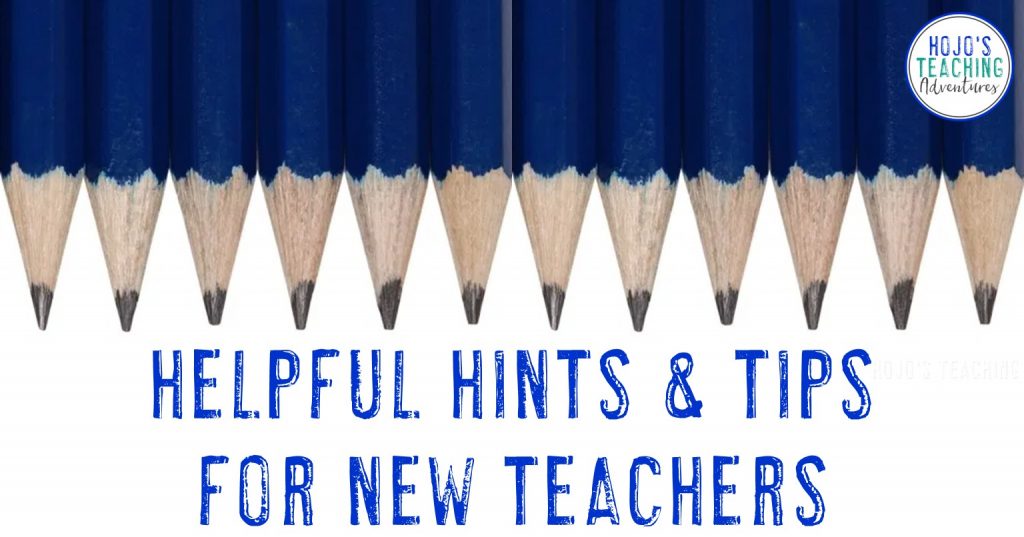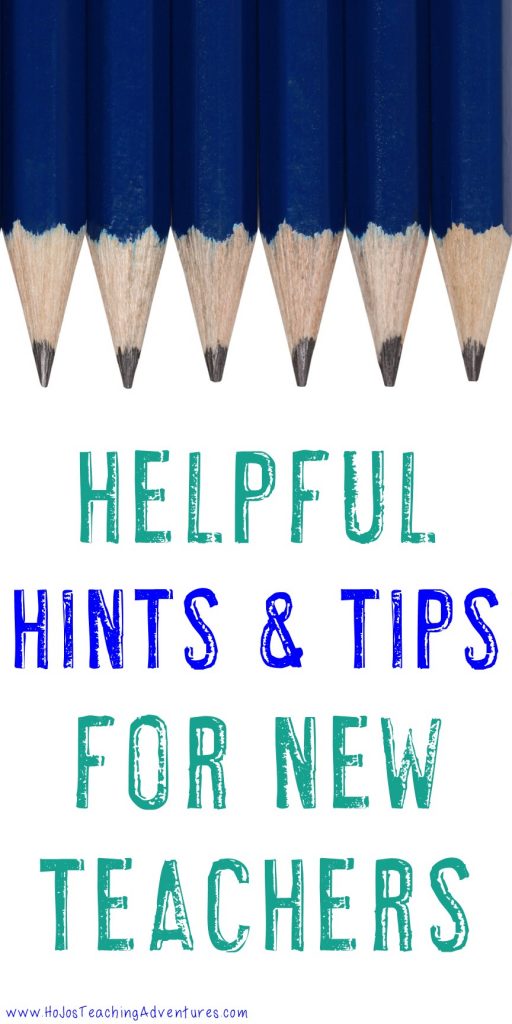Congratulations! You got through student teaching, found a teaching position, and you’re ready to get started. YEA! It’s an exciting time! Today I want to share some helpful hints and tips for new teachers.
Your brain is probably in overdrive right now. You’re trying to remember everything you learned during your years of college, while student teaching, and all the helpful information gathered from veteran teachers. But I know from experience you’re going to continue searching the web for more great information. So here’s my helpful advice broken down into five categories. Now let’s get started with my tips for new teachers!
This blog post contains affiliate links. See my full disclosure statement here.
Before School Starts
- Get your classroom set up. This might be the most obvious of our tips for new teachers, but it’s a must! Do you want student desks and tables, or are you going to try a newer approach with flexible seating? Will you have a desk? Or will you opt to skip that part? The opportunities are really endless, so decide what works best for you and your teaching style, but also choose something that will help students learn effectively.
- What will you put up on the walls? Will you start with a mostly empty classroom so students can add to it and feel ownership, or will you have most things up and ready to go?
- Are you required to post objectives, standards, or goals for each lesson? Decide how you will do this.
- Decide where you will post your classroom schedule. You’ll save yourself many questions by teaching your students to monitor the schedule for themselves.
- Where will you post your rules, procedures, and consequences?
- Will students help you with daily classroom chores? How will you convey this to them?
- Know how emergency drills work. (So you don’t walk to the wrong place during an evacuation drill with your entire class and cause your principal a mild panic attack when your class is unaccounted for. I don’t know who would ever do that. *Raises hand sheepishly…) Find out if you need to have this information posted in the room somewhere.
- Learn what grading program your school uses (if any), and see if you can get some training on it. Decide whether you will have a paper/pencil system as well, or if you’ll just use the online program.
Lesson Planning
- Keep in mind that engaged students cause less discipline problems. This doesn’t mean throwing worksheets in front of students all day long! They need to be actively engaged in meaningful work.
- How will your students papers be collected and handed in? Try to think about a system that is efficient and easy.
- What will you do about papers that are handed in with no names on them?
- What will the start of your day look like? What about the close of your day? Having daily routines in place will help make everything go more smoothly.
- Find out your school district’s lesson plan requirements. When are they due? How much detail needs to be included? Are standards to be written in as well?
- Will you have a late work policy? (Or does the district have a blanket policy on this?) What does this look like?
- How will you make assignments clear and understandable for your students and their families?
- Exactly what subjects are you teaching? Do your students rotate to any other classrooms for other subjects or specials? What will the schedule look like? Are there requirements for how long certain subjects need to be taught?
- How will you hold high, yet realistic expectations for your students? And don’t beat yourself up if you don’t know the answer to this right away. Your philosophy on education is going to change over the years. You will continue to grow every day! But we wouldn’t be doing our best to bring you these tips for new teachers if we didn’t at least include this bullet point!
- Keep learning as fun as possible! Engaged, happy students are more likely to do well and retain the information. Dancing with students in class, anyone?
- Be flexible. Lessons are going to change. Emergencies sometimes happen. Be prepared for the unexpected, but roll with it.
- When you start planning actual lessons for the first week of school, plan twice as much as you think you’ll need. After that, have a few activities planned that can be open-ended. You do not want to run out of meaningful content during that first week. (Oops! What do you do with a classroom of Kinders when you’ve gone through two days of what you had planned out, all your extras, and there’s still an hour left of the day? You panic! Then you get out the blocks and build patterns for a little bit. 🙂 ) If you overplan, you can always use those lessons in the upcoming days and weeks.
Classroom Management
- Put routines and procedures into place during the first day. Children need structure, and they’ll appreciate you for it – even if it doesn’t always look that way.
- Be consistent.
- Have a reward/discipline plan in place for the first day. Don’t wing it, or tell yourself they’ll behave. It doesn’t work. Trust me. 🙂
- Practice expectations. Want students to line up quietly? Tell them your expectation, then practice it. Model good behavior for students.
- Plan for transitions.
- Create routines. What will the morning look like? How will you know who is there each day? Decide how students will tell you if they have a sack lunch or are eating at school. How will students keep busy when others come into the room so you can handle all the regular morning paperwork?
- How will you get students’ attention? Will you ring a bell, use a hand signal, or ??
Build Student Relationships
- Show students you care! Give them a hug, high five, or handshake each day as they walk out the door. Greet them at the door each morning. Be friendly, but don’t be a friend.
- Communicate with students’ families. Call home, do home visits, e-mail, or send out newsletters. Make sure to use the “sandwich method” where you start with something positive, state a concern (if needed), and then end with something positive. Even making a two minute phone call just for a positive can turn a parent’s day around (and quite possibly yours and the students as well!). You might want to track this so you know who else to reach out to as well.
- Find ways to “catch” students doing good. Leave a quick little note on their desk. Or send out positive postcards.
Other Random Tips for New Teachers
- Make friends with the secretaries and custodians. These people are AWESOME, and you want them in your corner when needed.
- Get a sub bucket ready! Make sure this contains your daily schedule, routines, students who can help out, and some random games or assignments in case they get through your material more quickly.
- Continue attending professional development to learn as a teacher. This can be “official” things like college credits and CEUs, or even something as informal as Pinterest to help you learn more!
- Label your personal classroom materials. If you bought it, it’s yours to keep. If it was in the school when you got there, it stays. 🙂 Plus students and other teachers borrow things from one another regularly, so having your items clearly labeled ensures they get back to you. (Having a check out system in place might help though.)
- Don’t spend a ton of money on your classroom! You probably already have more student loan debt than you want to think about. There are a LOT of great DIY projects all over the internet (hello, Pinterest!) that can help you stock your classroom full of books, creative organization, and more for very little money.
- If your school does not provide a mentor teacher for you, reach out to your peers for help. Ask questions! We have all been new at some point, so we know how tough it can be. They’re going to be a great source of information!
- Dress professionally! You don’t want to look like the students. If there is a staff dress code, follow it. If there isn’t one for staff, read the student dress code policy and make sure you are at least following that. Some schools have rules about length of skirts/shorts, types of sandals/open toed shoes, how wide shirt straps have to be, and more. And please do not wear sweats for dress-down day, unless that is typical at your school. (Yes, I know a teacher who did this, and then she got upset when the principal talked to her. Dress down day is typically not a day for sweats!)
- Hang on to all the classroom love you get from students during the year (you WILL get some!). There are going to be tough days, so you want a folder or drawer of positive things to remind you why you chose this profession in the first place. 🙂
- Keep your head up! Teaching is tough, but you can do this! Every day is not going to be a walk in the park, but teaching is a great profession.
- Purchase a copy of The First Days of School by Harry Wong if you didn’t get it during your college courses. This is the BEST book on education that I refer to each year. It has EVERYTHING you could possible need to know about teaching, and I could not recommend it more! {I *may* have three copies of this book in my house right now…}
I hope my list of helpful ideas and tips for new teachers has been helpful! Please share any further ideas you have in the comments below. And if you’d like to receive e-mail updates with great teaching ideas, tips, and freebies – please join my preK-6 newsletter!
- How to Prepare for a New School Year When You’re Switching Grades
- FREE Bright School Year Printable Tag (for students OR staff!)
- Stomp Out Inappropriate Language at the Beginning of the Year
- School Rules: How to Start the Year Off Right
- Stopping Behaviors Before They Start
- “That’s Easy!” – The Impact of Such a Simple Phrase
- Gathering Student Information FREEBIE
- Creating Tolerance in the Classroom



Leave a Reply